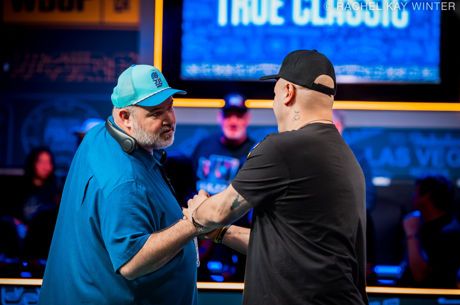Why the Words We Use Matter in Poker

With that title and a picture of Phil Hellmuth at right, you might expect an article warning against using bad language or name-calling at the table. But actually I have a different kind of “name-calling” in mind — that is, the special vocabulary we use to describe what happens at the poker table, and to understand what happens, too.
A recent Card Player magazine column by John Vorhaus discussed his fondness for coming up with names for things while he’s playing poker — nicknames for players, for hands, for situations, or for just about anything else. Naming things, he reasons, gives us a way of understanding them, and thus power over them.
I’m sure that he’s right. In fact, the idea that knowing the name of a person gives one power over him is found throughout our literature and arts.
In the book of Genesis, Jacob demands to know the name of the angel he wrestles with through the night. In the tale of Rumpelstiltskin as collected by the Brothers Grimm, the miller’s daughter is able to get out of giving her firstborn son to the imp only by learning his name through eavesdropping. The entire plot of Puccini’s opera Turandot revolves around the title character trying to learn the secret name of a suitor she does not want to marry, thus giving her power to have him killed.
But unlike Vorhaus, when it comes to poker I’m more interested in the real or common names of things than in making up my own.
For example, watching a player for a while and realizing that he fits the description of “loose-aggressive” immediately brings to mind all of the information that I have accumulated over the years about how that kind of player thinks and acts, and what strategies will be best to take his money.
If you end up with Phil Hellmuth at your tournament table, think about what a wealth of data you have about how he plays from watching him on TV over the years. All of that is triggered by the name, “Phil Hellmuth.” I suppose if somehow you had never learned his name, you could still access that information under something like “The guy that wears a hat with a funny PH symbol on it.” But isn’t his real name an obviously better handle with which to open the door to the room in which the relevant information has been stored?
As another example, I had been playing poker for a few years before I first heard the term “donkey bet,” or just “donk bet.” Of course I had seen players make a lead-out bet on the flop into the preflop raiser, but I had never thought of giving it a name. Once I had a label to apply to it, however, I was much better able to start synthesizing my knowledge about it. This happened in two ways.
First, when I’m involved in a poker game and I see somebody donk-betting, the label makes it easier to encode any associated information — e.g., this player donk-bets every time it’s an uncoordinated flop without an ace. That would be much harder to do if I didn’t recognize “donk bet” as a specific entity. Knowing the words used to describe the action — giving it a name — automatically gives it a place in one’s mental filing cabinet.
Second, when I read books or articles about poker and they talk about donk bets, I have a mental category under which to file that strategic advice, whether it’s how to interpret such a bet, how to counter it, or how and when to deploy it. And it is here that knowing the common names of things is more important than making up your own names for them. We can only learn from others’ experience if we all use the same names and labels.
A few months ago, I saw a fascinating documentary, Somm, about a group of friends trying to pass the notoriously difficult test to become master sommeliers. I had assumed that people with exceptional ability to identify wines just had an advanced ability to remember the taste of a particular wine, paired with information about its origins. This film made clear, though, that I had it wrong.
Instead, they train to break down each wine into a large number of individual characteristics. They can then compare that to a mental database of wine traits, memorized from flash cards. In short, they can “look up” a wine by first applying a label — a name — to each of its taste and smell characteristics.
I submit that effective poker learning is like that. There is a limited amount you can learn at what we might call a “gestalt” level — just general experience. Your learning will be much more effective if it’s broken down into pieces to which you can attach names.
To further apply the wine analogy, think about a poker situation in which you have to determine whether an opponent is bluffing or value betting (which themselves are two important names for poker concepts).
You might have some hard-to-identify general feeling about the question, but you’re far more likely to get the answer right if you break down your thinking into categories. Is this a cash game or a tournament? What position is this player in for this hand? What is his general style of play? How large is the bet compared to the pot? How many other players are in the hand?
The answers to those and other related questions help you locate this specific situation in your multidimensional mental database of poker experience. Early position is in one part of the database, late position another, and so on. With this process, you give proper weight to each individual piece of information available to you, rather than just going with a gut feeling about what to do.
That process requires names for everything — for poker hands, for player types, for positions, for betting lines, for tells, for situations.
While I agree with Vorhaus about the value of names of things for understanding them and gaining power over them, I think it’s more important to have access to those in general use in the poker world than ones we make up for ourselves — that is, to learn what all of those words we already use in poker mean. The more specific entities for which you have names, the more accurately you can “look up” what to do. Moreover, you’ll be better positioned to learn from poker strategy reading how others handle similar situations.
So, you know, don’t just learn how to spell “poker” (as I seem to recall a player once accusing another of being unable to do). Learn all of the words used to name things in poker, too, and increase your understanding of the game.
Robert Woolley lives in Asheville, NC. He spent several years in Las Vegas and chronicled his life in poker on the “Poker Grump” blog.
Get all the latest PokerNews updates on your social media outlets. Follow us on Twitter and find us on both Facebook and Google+!









